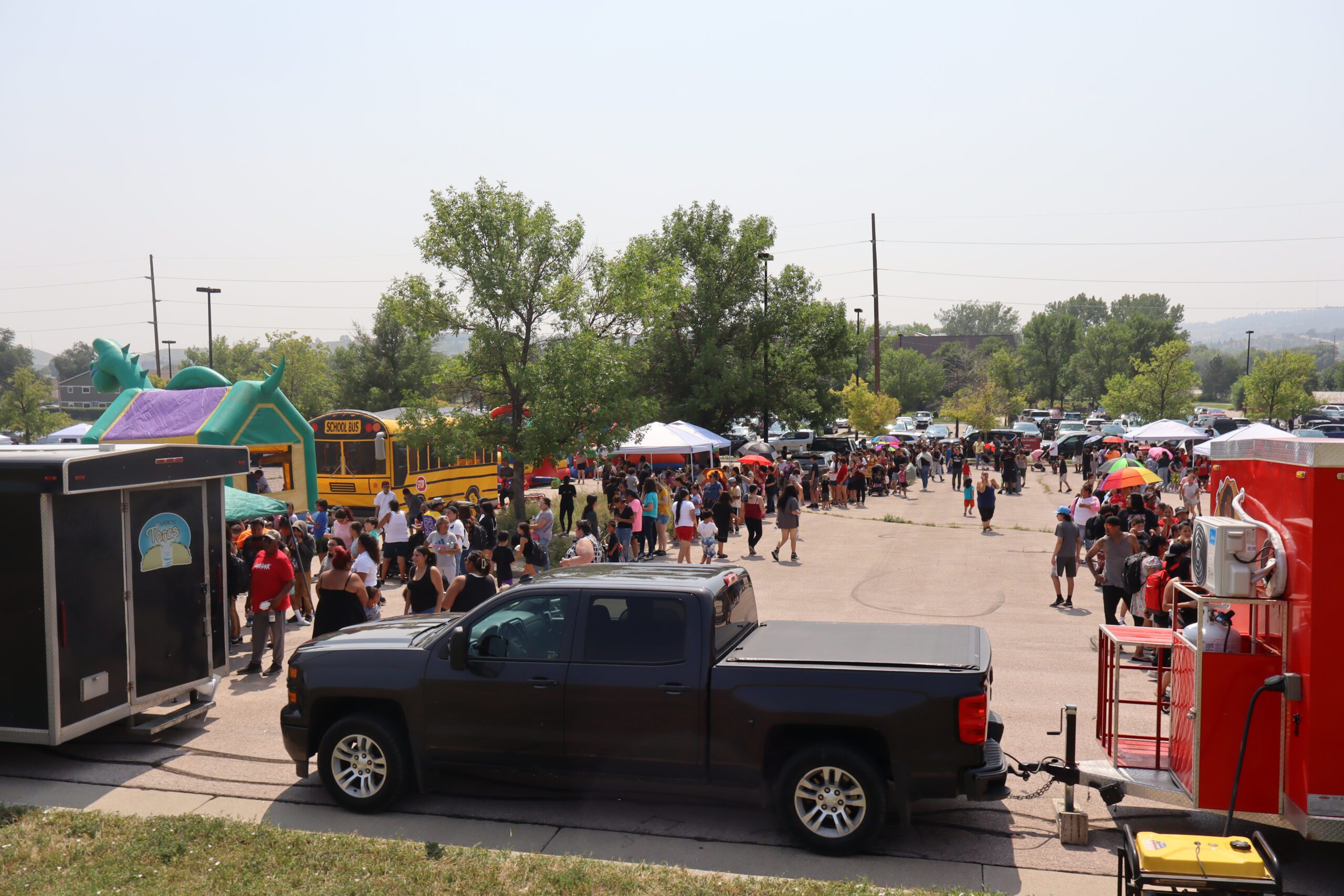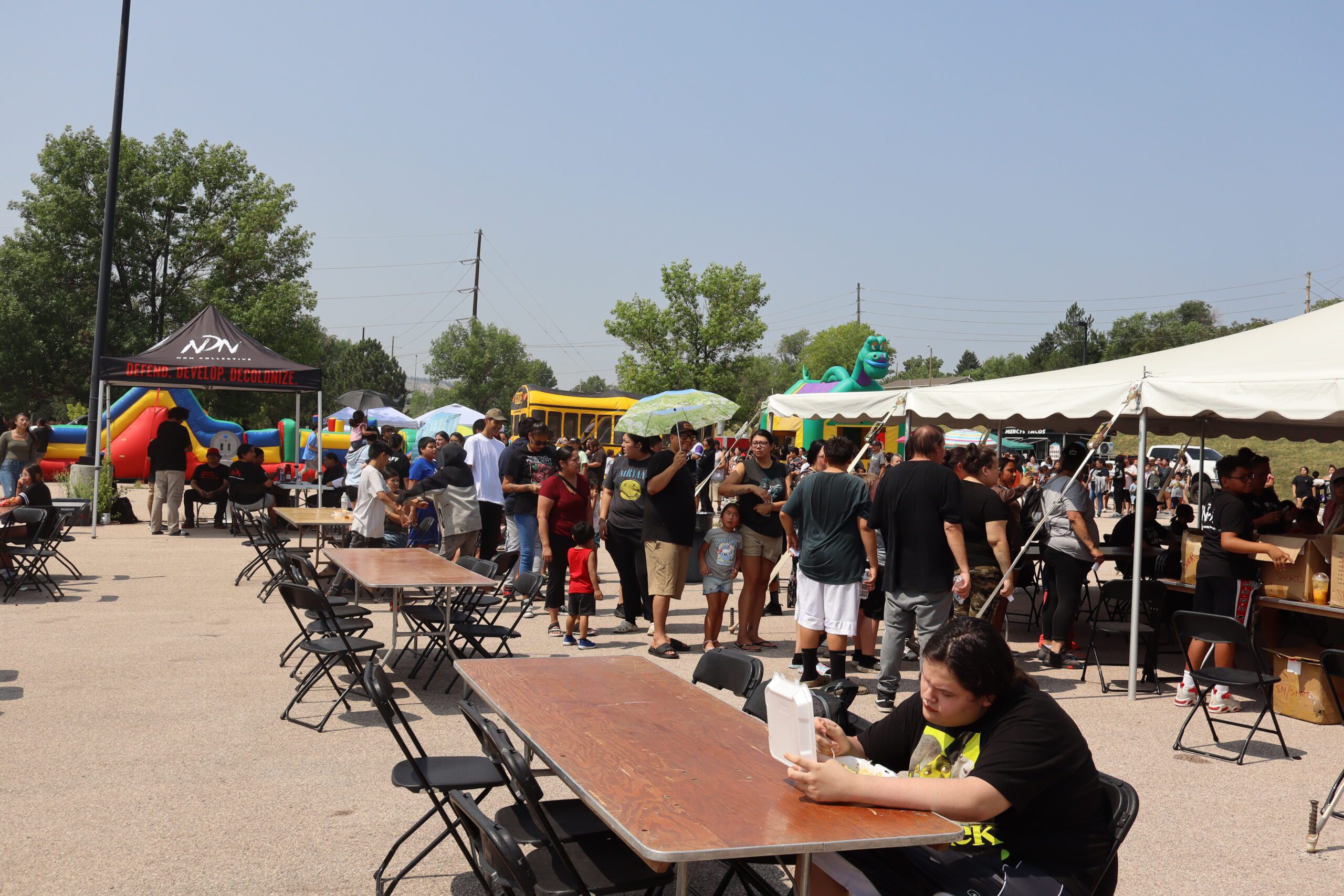Backing kids with backpacks and bison burgers

Registration line can be seen on both the left and the right beyond the food truck vendors and their patrons in the foreground. (Photo by Marnie Cook)
MINILUZAHAN – The lonely parking lot behind the Journey Museum came alive on Friday as NDN Collective hosted their Fifth Annual Backpack Giveaway from 12pm to 4pm. Many people started lining up for the free event half an hour before registration began at noon. Even though it was hot and humid there was a festive spirit, enhanced by the delicious aromas of juicy bison burgers, authentic tacos, and barbecue roast beef from local food trucks. NDN Collective’s Director of Community Engagement, Murray Lee, noted that this was the largest turnout since the event’s inception.
The first annual event was held at the NDN Collective headquarters on Haines Avenue. “We originally started this in 2020, back when everyone was keeping their kids at home,” said NDN Collective President and CEO Nick Tilsen, speaking of the COVID-19 pandemic era. “The kids still needed school supplies, but they needed school supplies at home.” Tilsen said they thought they would host an event and give away a couple hundred backpacks to help families. At the time, the parking lot headquarters was adequate but since then the event has outgrown the headquarters parking lot. Tilsen said this year they decided to host it at the parking lot behind the Journey Museum.
It seemed fitting that the event would take place in the area behind the Journey Museum. Nearly two decades ago, this area had once been designated for the Powwow Gardens and Indian Art Market, a project which had been approved as part of the 2012 Vision Fund. Among the goals of the project was to bring healing between the city and the Native American community. It was envisioned to attract tourists to the city center, offering them a chance to experience the old West and learn about Native American culture. The project would highlight the Journey Museum as a central attraction of the downtown area and a neighbor of the Civic Center. It would be a convergence of healing, history, culture and entertainment.
There were objections from city council members and officials over the amount of funds, more than $800-thousand dollars, which opposers considered an over-expense. It would also need ongoing revenue and then there was the problem with the location. It was in the flood plain. But then so was the Journey Museum, a hotel, an arena, a senior center, a boy’s club as well as a wide variety of other activities and interests which remain in the flood plain. Opposition was unrelenting and eventually included criticisms of how the Journey Museum was costing the city money. It too needed ongoing revenue. In the end, the project lingered too long in limbo and eventually plans were discarded.
Since then, the parking lot has been neglected and unused. “Now, there’s a couple thousand people coming through today,” said Tilsen as he waved his outstretched arm acknowledging the large crowd.
“We have just kept growing this event every year. We really wanted to take some of the pressure off families. If there are three, four, five kids in the household, you have grandma’s and grandpa’s taking care of their grandkids. You have families who are taking in other kids. So, we know how it is in Indian Country and Native communities. We want to do what we can to help in any small way.”
Headphones were a part of this year’s ‘swag’ (backpack and supplies). Tilsen said headphones are popular with the kids. “They can listen to music to and from school and it helps create excitement around education and shows the kids that they matter and that they are important.”
Tilsen talked about the partner organizations that had set up tables and were offering services and outreach efforts to the Native community. “Residents can learn about the Know Your Rights campaign and be involved in their community.”
Head Start representatives were on hand to enroll kids in the program. “We have to keep fighting for Head Start.” Tilsen said the data is there. “You invest in early childhood education, in that age group, it carries them through school. The data shows that kids who have gone through Head Start are 75-percent more successful. Head Start helps stabilize the family so they can work. People have to look at it a bit from the educational standpoint, as well as the economic standpoint. The folks who are fighting Head Start are always talking about needing more jobs. Now that there are enough jobs, then you need people to work those jobs. If you get rid of programs like Head Start, then you won’t have people to fill those jobs.” Tilsen said parents of kids who are going to Head Start are filling those jobs.
“But politicians do these things that don’t make sense,” explained Tilsen. “If you want to reduce inflation rates, if you care about the GDP, then you have to invest into communities. It is the communities of color and poor communities that work in these service jobs that make the economy function. By eliminating Head Start you have a negative impact on those communities as well as the economy in your community and those impacts ripple across the whole country.”
The long-term impacts of early learning are invaluable. For children who participate in Head Start, the advantages appear immediately, last a lifetime and can even impact generations. The return on investment for disadvantaged kids who receive high-quality, birth-to-five education, like Early Head Start plus Head Start can be as high as 13-percent annually, according to a working paper from 2016 titled ‘The Life-cycle Benefits of an Influential Early Childhood Program.’
Helping parents and kids every school year is a sound investment too. Tilsen said that families spend hundreds of dollars on supplies and school clothes every year. “It may seem small and insignificant but covering expenses like backpacks, kids’ electronics and school supplies can have a stabilizing effect on families. It takes the pressure off, and the reality is, many families who live in poverty are struggling. Stress can be the worst possible thing. So being able to take some of the pressure off is a good thing for families and helps stabilize families as we go into the school year. It helps build community.”
Tilsen said they also invited the food trucks to come. “We are supporting local vendors too. We pre-bought meals from them and gave out meal tickets to folks. So, the people get free meals, and the entrepreneurs get paid too.” There were enough local food trucks – Mercy’s Tacos, Dan’s Smokin’ Country BBQ, Malissa’s Frybread and Tatanka Wings – to prevent any long lines.
The registration line remained long as it snaked its way past the food lines, curling around the bouncy houses, bending past the tables of local organizations as it stretched its way across the parking lot to its destination under a large tent where people could get their backpacks, sit and eat in the shade and listen to music played by a live DJ.
The event had been underway for about an hour and a half when registration for swag closed. Master of Ceremonies Cante Heart from event partner He Sapa Otipi, assured that every person at that time who had a ticket for a backpack and swag and/or food would still be able to get their food and backpack and their swag.
“It’s been really rewarding doing work like this in the community,” said Tilsen as he looked across the parking lot of smiling kids and parents. “We talk a lot about all these things we want to change in the world. At the same time, you are working for systemic changes, but you also have to be out in the streets, on the land and in the community. You have to be able to do those things at the same time as you are working for longer-term solutions. That’s why I’m proud of our NDN Collective team, our local partner organizations and the families for showing up and being supportive of the work that we’re doing and, in this case, really centering around the kids.
Other partners in the event were Oaye Luta Okolakiciye (OLO), Oceti Sakowin Community Academy, Black Hills Center for American Indian Health, Rural America Initiative, and Western SD Community Action.
(Contact Marnie Cook at cookm8715@gmail.com)
The post Backing kids with backpacks and bison burgers first appeared on Native Sun News Today.

